At San Diego State, Fa’a Samoa is Fa’a Aztec
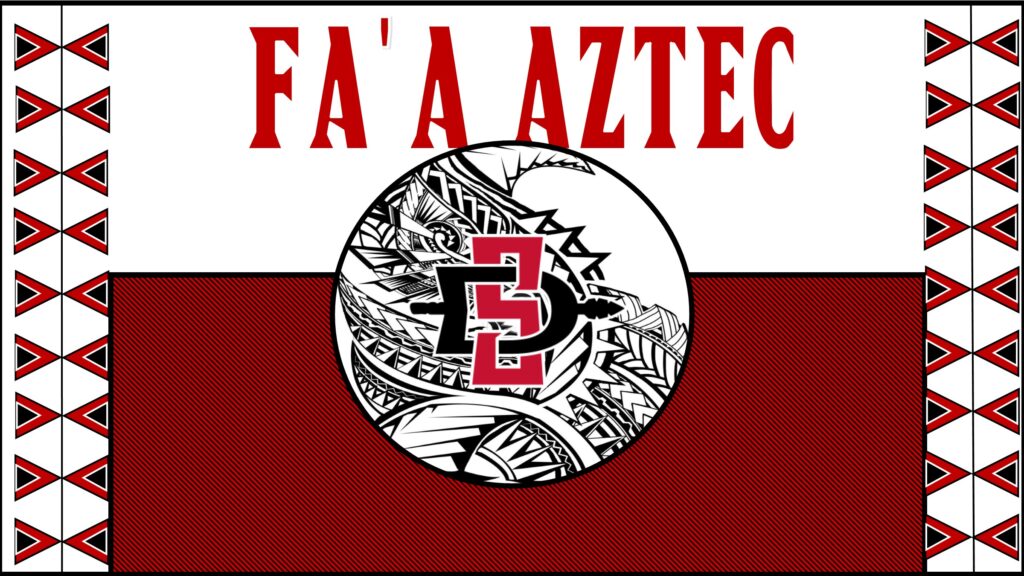
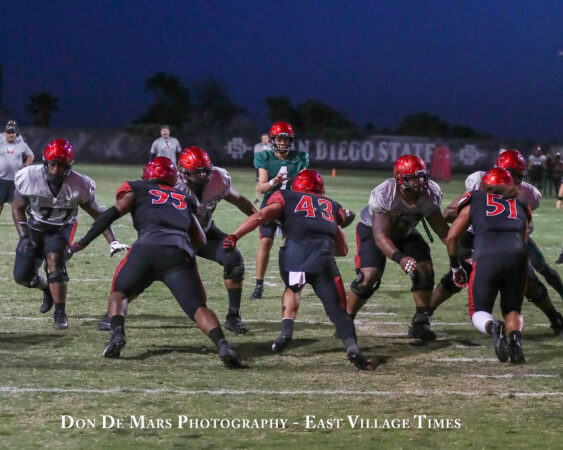
Samoan is the oldest Polynesian culture. Its beginnings date back roughly three millennia. A modern genetic study of over 1,100 present-day Samoans estimates that the original community that populated the island only had between 800 and 3,000 people.
The first Europeans came to Samoa in the 18th century, just a decade before George Washington was born. This encounter brought with it the blessing and curse seen around the world described succinctly as colonialism.
“Let’s be clear about the tension force that you mention,” Andrew Aumavae said on the upcoming Father’s Day Episode of The SDSU Football Podcast. “That tension force is mainly for most marginalized communities when migrating to the states. It’s directly connected to colonization and the idea that in order to fit into the American way, you have to shed a piece of your whole, you’re authentic self. …The funny thing is no one tells you can be both and that your cultural assets are valuable in making that transition.”
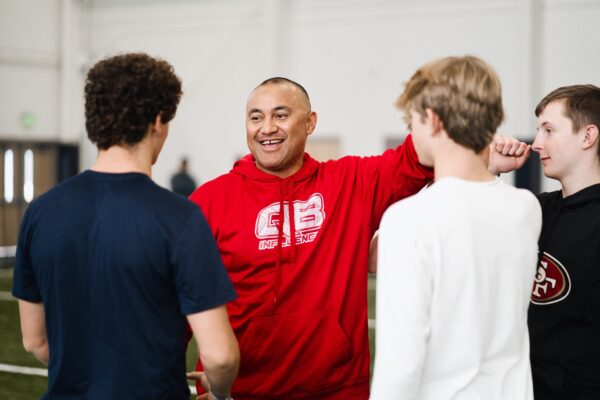
As a marginalized community, even on their own island, Samoan ingenuity has carved out ways to keep their ancient lifestyle alive. Each generation is taught the virtues of Fa’a Samoa. Translated as the “Samoan way,” it is a catchphrase that captures the essence, expectation, and experience of these amazing people.
Samoan courage, intelligence, and creativity can be clearly seen in the thousands of ways they have adapted to the changes brought on by colonization while also keeping their cultural distinctiveness. They have thrived as businessmen, artists, educators, and in every walk of life. Most famously, Samoans have excelled in athletics, especially football. In 2010, CBS News estimated that a boy born to Samoan parents has a 56 times greater chance of making it to the NFL than any other boy in the US.
Fa’a Samoa
There is a saying in American sports, “play for the name on the front of the jersey, not the name on the back.” It is used to convey the idea that the best players are those that compete for the good of the team and not their personal glory. Samoans embody this ethos in everything they do. In football, though, they have turned the saying on its ears.
Part of Fa’a Samoa is that every action taken by an individual reflects completely on his or her family. By playing for the name on the back of the jersey, Samoans sacrifice for the name on the front.
“Fa’a Samoa is essentially a way of life…,” SDSU tight end coach Savai’i Eselu explained to EVT. “It’s truly a way of life where everything you do will be reflected back on your last name. Everything I do will reflect back to the Eselu family. Everything Troy (Polamalu) did will reflect back on the Polamalu family. It’s not even just in the Samoan culture. Just the Polynesian culture in general, you talk about the Lakalaka’s, you talk about the Fiaseu’s, you talk about all the Poly’s that we have on our squad, it all goes back to the family.”

Like all lifestyles, there is danger and beauty when living out this culture. If someone rejects it and lives selfishly, they can take advantage of the rest, who are intent on a different way. When everyone embraces it, there is beauty and a hidden power that defies concrete definition. Safety in this community lies in surrounding oneself with authentic followers of Fa’a Samoa and rooting out the pretenders.
This task of separating the gold from the dross is easy for those inside the culture, but it is nearly impossible to do with those outside. A shortcut for many Polynesians, when faced with the unfamiliar, is to trust the Polynesians already living in the situation.
A perfect example of this is the recruitment of Aztec QB Liu Aumavae. Liu and his family only considered schools with at least one Polynesian on their coaching staff. The Aumavaes trusted everything Eselu told them about SDSU because any falsehood would reflect not just on Eselu but on everyone who has that name.
“Oh, yeah, definitely,” Aumavae responded when asked if Eselu’s presence on SDSU’s staff was important in the recruiting process. “As a family, we sat down, and we had three non-negotiables. One of them was fit. When we talk about fit, we’re talking about social fit, educational fit, demographic (fit), so do we see our kind. … So, having Savai’i (Eselu) on (the staff) was huge … having those guys on there gave me a sense of familiarity. I knew someone who’s going to be there, who is going to take care of the kid. … that comfort in knowing there’s someone there who looks like me, talks like me, and has the same experiences as me and the same values. All we were looking for was community. People who shared the same values and thought processes. That was huge for us.”
[wpedon id=”49075″ align=”right”]
Fa’a Hoke
The congruence between Fa’a Samoa and SDSU’s football culture does not end with Eselu and Justin Ena. It extends to most if not all members of the coaching staff. Assistant head coach Jeff Horton is spoken about as a father figure by the players in the running back room. The affection for defensive coordinator Kurt Mattix by his players is easy to see. Offensive coordinator Jeff Hecklinski genuinely cares about the quarterbacks he coaches.
Aumavae’s second non-negotiable in his son’s recruitment was that whoever coached him would care for Liu just like he did. He found that in Hecklinski along with Eselu. No higher compliment could be paid to a coach.
All of this works only if the person who runs the program also embodies the ethos.
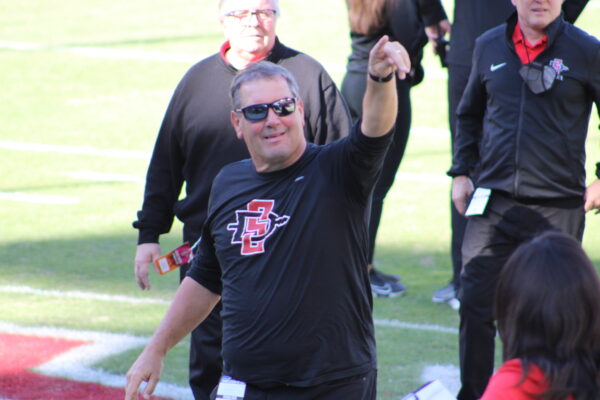
“Coach Hoke, he’s got to be a Polynesian because the way he carries himself, the way I have seen his track record, the way I have seen him work every single day, it really exemplifies and resonates who we are as Polynesians and what we stand for,” Eselu explained. “If you stay with coach Hoke for ten minutes, you’re going to feel the love, the respect. You’re going to feel the honor, and you’re going to feel the hospitality … I pretty much see him as what we call Uso, a brother, like an older brother to me, like a father figure. … I don’t think there’s anyone like him in terms of the way he carries himself. He is Samoan. His is Tongan. He is Polynesian. That man is a Poly. He’s an honorary Poly.”
As the head of the Aztec family, Hoke is the reason so many like-minded coaches are on staff. It is for this reason that his lieutenants have a fierce loyalty and admiration for him. Fa’a Samoa is Fa’a Hoke.
Fa’a Aztec
Over the past half-decade or so, the staff has placed a renewed emphasis on finding not just Samoans but Polynesians who share in these values. Going forward they aim to have a core group of Polynesians in every recruiting class.
This re-emphasis has come at the perfect time. Social media has made self-awareness, self-centeredness, and self-absorption the dominant characteristic of society. Whenever one idea gains supremacy, its opposite also grows in prevalence, if only out of rebellion.
Just as athletes the world over build their brand by making a mixtape of every game or posting every workout, there is a smaller contingent who are turned off by the noise and just want to compete. SDSU has carved out a niche among these people.
“Everything is relationship, especially when talking about recruiting,” Eselu said. “It’s never been the glitz and glamour (at SDSU). That’s what I love about coach Hoke, coach Hall. What you see is what you get. We ain’t blowing no smoke. If you want to be part of a crew that works, let’s do it.”
“It’s important to understand with coach Hoke and the way that all of this is embodied in terms of recruiting. He’s really wanting to make a huge staple in the Polynesian lifestyle, in the Polynesian culture, wanting to make sure that there’s a solid presence of Polynesians in the locker room.”
SDSU’s refocus coincided with a dynamic at work in the Polynesian football community. The fruit of the fight the last generation fought is bearing in the present. Samoans primarily played four positions in the past. Larger Samoans were offensive and defensive linemen. Those with medium builds played linebacker, and those on the smaller side played defensive back.
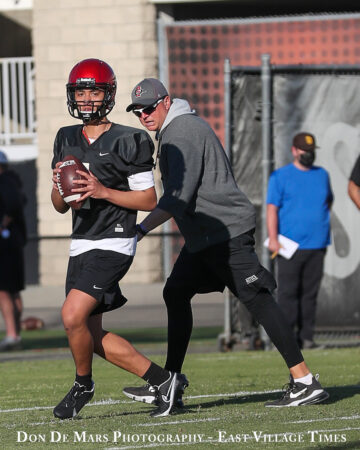
While continuing to excel in these roles, Samoans have been working to break the stereotype. The elder Aumavae turned down offers to play defensive back from multiple Pac-12 schools so he could play QB and continue pursuing basketball in college. Eselu played tight end. The work of an entire generation has paid off with Samoans excelling at positions their ancestors were prevented from experiencing, among them, QB.
The Aztecs made history last year. They were the first program to offer a QB from the island of Samoa when they extended a scholarship offer to Oakie Salave’a. Salave’a did not end up at SDSU, but his cousin, Liu, did. After only one semester of intensive college weight training, Aumavae said Liu’s “genetics” have taken over. He is no longer the slender signal-caller who came onto campus in January. Liu has already added 15 pounds.
Roughly 200,000 people of Samoan descent live in the United States. In various subcommunities, primarily in the west, they have kept the values of their ancestors alive. Under the guidance of “Uso Hoke,” SDSU has grown into one of the places where Polynesian culture is thriving. At San Diego State, Fa’a Samoa is Fa’a Aztec.
My earliest sport’s memory involve tailgating at the Murph, running down the circular exit ramps, and seeing the Padres, Chargers and Aztecs play. As a second generation Aztec, I am passionate about all things SDSU. Other interests include raising my four children, being a great husband and teaching high school.
Wonderful story about the Samoan players and a team dynamic that all Aztecs can point to with pride.